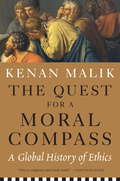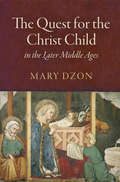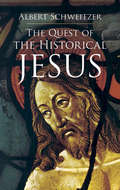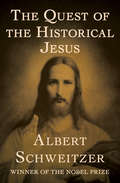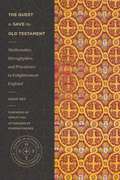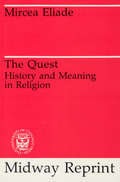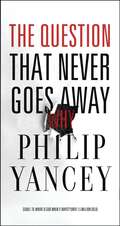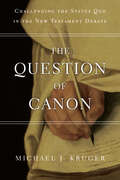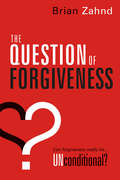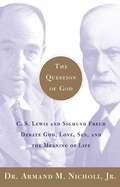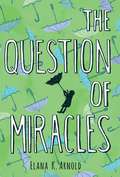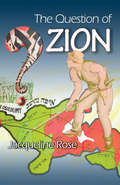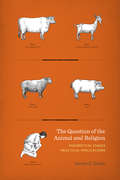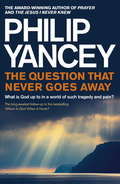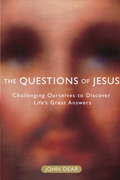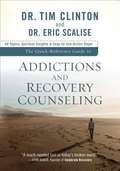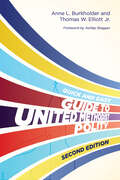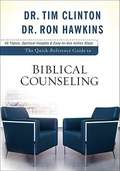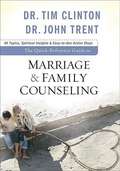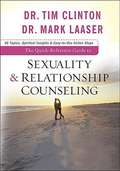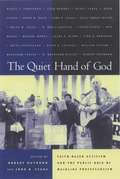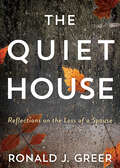- Table View
- List View
The Quest for a Moral Compass
by Kenan MalikThe story of the global search for moral truthsIn this remarkable and groundbreaking book, Kenan Malik explores the history of moral thought as it has developed over three millennia, from Homer's Greece to Mao's China, from ancient India to modern America. It tells the stories of the great philosophers, and breathes life into their ideas, while also challenging many of our most cherished moral beliefs.Engaging and provocative, The Quest for a Moral Compass confronts some of humanity's deepest questions. Where do values come from? Is God necessary for moral guidance? Are there absolute moral truths? It also brings morality down to earth, showing how, throughout history, social needs and political desires have shaped moral thinking. It is a history of the world told through the history of moral thought, and a history of moral thought that casts new light on global history.
The Quest for the Christ Child in the Later Middle Ages (The Middle Ages Series)
by Mary DzonBeginning in the twelfth century, clergy and laity alike started wondering with intensity about the historical and developmental details of Jesus' early life. Was the Christ Child like other children, whose characteristics and capabilities depended on their age? Was he sweet and tender, or formidable and powerful? Not finding sufficient information in the Gospels, which are almost completely silent about Jesus' childhood, medieval Christians turned to centuries-old apocryphal texts for answers.In The Quest for the Christ Child in the Later Middle Ages, Mary Dzon demonstrates how these apocryphal legends fostered a vibrant and creative medieval piety. Popular tales about the Christ Child entertained the laity and at the same time were reviled by some members of the intellectual elite of the church. In either case, such legends, so persistent, left their mark on theological, devotional, and literary texts. The Cistercian abbot Aelred of Rievaulx urged his monastic readers to imitate the Christ Child's development through spiritual growth; Francis of Assisi encouraged his followers to emulate the Christ Child's poverty and rusticity; Thomas Aquinas, for his part, believed that apocryphal stories about the Christ Child would encourage youths to be presumptuous, while Birgitta of Sweden provided pious alternatives in her many Marian revelations. Through close readings of such writings, Dzon explores the continued transmission and appeal of apocryphal legends throughout the Middle Ages and demonstrates the significant impact that the Christ Child had in shaping the medieval religious imagination.
The Quest of the Historical Jesus: A Critical Study Of Its Progress From Reimarus To Wrede
by Albert Schweitzer F. C. Burkitt W. MontgomeryIn this groundbreaking work that made his reputation as a theologian, Albert Schweitzer traces the search for the historical person of Jesus (apart from the Christ of faith) and puts forward his own view of Jesus as an apocalyptic figure who preached a radical message of the coming of the Kingdom of God. Though Schweitzer's own proposals about Jesus no longer command assent, his lasting contribution, comprising the bulk of the book, is the critique of his predecessors. Through examining the works of more than 50 18th- and 19th-century authors and scholars, he shows conclusively that each historical reconstruction of Jesus was largely a fantasy made in their own self-image.Schweitzer's work has proved the touchstone for all subsequent quests for the "Jesus of history." It also contributed in no small measure to the remarkable resurgence in Jesus studies in the latter part of the 20th century, which culminated in the much publicized and highly controversial findings of the Jesus Seminar.
The Quest of the Historical Jesus: A Critical Study Of Its Progress From Reimarus To Wrede (classic Reprint) (Fortress Classics In Biblical Studies)
by Albert SchweitzerRenowned scholar and author Albert Schweitzer&’s world-changing study of the true life and teachings of Jesus of Nazareth The Christian religious tradition has shaped much of our world for two millennia. But separate from the practice of Christianity is the factual life of Jesus himself. In this groundbreaking study, philosopher and Nobel Peace Prize winner Albert Schweitzer delves into biblical text and historical evidence to deconstruct the many myths of Jesus&’s life that have been propagated through the centuries. A seminal work, Schweitzer&’s book brings into focus the social and political currents of Jesus&’s time to rebut previous authors&’ hypotheses and form an entirely new one of his own. A milestone text in its time, Schweitzer&’s book was so dominant that virtually no new scholarly investigations of the historical Jesus were published for decades after its initial release. Now, more than a century later, The Quest of the Historical Jesus remains the standard against which religious academic studies are measured. This ebook has been professionally proofread to ensure accuracy and readability on all devices.
The Quest to Save the Old Testament: Mathematics, Hieroglyphics, and Providence in Enlightenment England (Studies in Historical and Systematic Theology)
by David NeyEnlightenment attempts to save the Old Testament Pastors and scholars today lament the Old Testament's neglect in the West. But this is nothing new. In the eighteenth century, natural philosopher John Hutchinson witnessed the Old Testament becoming devalued as Scripture. And in his mind, the blame lay with Isaac Newton. In The Quest to Save the Old Testament, David Ney traces the battle over Scripture during the Enlightenment period. For Hutchinson, critical scholarship's enchantment with the naturalism of Newton undermined the study of the Old Testament. As cultural forces reshaped biblical interpretation, Hutchinson spawned a movement that sought, above all, to reclaim the Old Testament as Christian Scripture. Hutchinson's followers sought to be shaped by Scripture, not culture. Rejecting the Newtonian degradation of history, they offered a compelling figural defense of the Old Testament's doctrinal and moral significance. The Old Testament is the voice of Providence. It is the means of discerning God's hand at work both in nature and in history. The Quest to Save the Old Testament is a timely retelling of fateful and faithful attempts to "save" the Old Testament.
The Quest: History and Meaning in Religion
by Mircea EliadeIn The Quest Mircea Eliade stresses the cultural function that a study of the history of religions can play in a secularized society. He writes for the intelligent general reader in the hope that what he calls a new humanism "will be engendered by a confrontation of modern Western man with unknown or less familiar worlds of meaning. " "Each of these essays contains insights which will be fruitful and challenging for professional students of religion, but at the same time they all retain the kind of cultural relevance and clarity of style which makes them accessible to anyone seriously concerned with man and his religious possibilities. "—Joseph M. Kitagawa, Religious Education
The Quest: History and Meaning in Religion (Midway Reprint)
by Mircea EliadeIn The Quest Mircea Eliade stresses the cultural function that a study of the history of religions can play in a secularized society. He writes for the intelligent general reader in the hope that what he calls a new humanism "will be engendered by a confrontation of modern Western man with unknown or less familiar worlds of meaning." "Each of these essays contains insights which will be fruitful and challenging for professional students of religion, but at the same time they all retain the kind of cultural relevance and clarity of style which makes them accessible to anyone seriously concerned with man and his religious possibilities."—Joseph M. Kitagawa, Religious Education
The Question That Never Goes Away
by Philip YanceyFinding Meaning in the Midst of Suffering In his classic book Where Is God When It Hurts, Philip Yancey gave us permission to doubt, reasons not to abandon faith, and practical ways to reach out to hurting people. And now, thirty years after writing his first book, Yancey revisits our cry of “Why, God” in three places stunned into silence by the calamities that have devastated them. At some point all of us will face the challenges to faith Yancey writes about and look for the comfort and hope he describes. There are reasons to ask, once again, the question that never goes away: Where is God when we suffer? And Yancey, once again, leads us to find faith when it is most severely put to the test.
The Question of Canon: Challenging the Status Quo in the New Testament Debate
by Michael J. Kruger2013 Preaching Survey of the Year's Best Books for PreachersPreaching's Preacher's Guide to the Best Bible Reference for 2014 (New Testament General) Did the New Testament canon arise naturally from within the early Christian faith? Were the books written as Scripture, or did they become Scripture by a decision of the second-century church? Why did early Christians have a canon at all? These are the types of questions that led Michael J. Kruger to pick apart modern scholarship?s dominant view that the New Testament is a late creation of the church imposed on books originally written for another purpose. Calling into question this commonly held "extrinsic" view, Kruger here tackles the five most prevalent objections to the classic understanding of a quickly emerging, self-authenticating collection of authoritative scriptures. Already a noted author on the subject of the New Testament canon, Kruger addresses foundational and paradigmatic assumptions of the extrinsic model as he provides powerful rebuttals and further support for the classic, "intrinsic" view. This framework recognizes the canon as the product of internal forces evolving out of the historical essence of Christianity, not a development retroactively imposed by the church upon books written hundreds of years before. Unlike many books written on the emergence of the New Testament canon that ask "when?" or "how?" Kruger focuses this work on the "why?"—exposing weaknesses in the five major tenets of the extrinsic model as he goes. While The Question of Canon scrutinizes today?s popular scholastic view, it also offers an alternative concept to lay a better empirical foundation for biblical canon studies.
The Question of Forgiveness
by Brian ZahndIn this little book, we discover that if Christianity isn&’t about forgiveness, it&’s about nothing at all. But is there a limit to forgiveness? Is it always possible? Or even always right? This book begins with Simon Wiesenthal, an Austrian Jew imprisoned in a Nazi concentration camp during WWII, who was confronted with the plea for forgiveness from a dying Nazi SS soldier. This book will challenge you with the question: &“What would you do?&” The Question of Forgiveness reminds us that Christ&’s command to love your enemy is very hard to do, but as followers of Christ, we are called to believe that love is more powerful than hate—something that Christ modeled to the extreme of Calvary&’s cross. Zahnd digs into the question of forgiveness, and concludes with this: beyond the suffering of unconditional forgiveness lie the resurrection of love and the triumph of peace.
The Question of God: C.S. Lewis and Sigmund Freud Debate God, Love, Sex, and the Meaning of Life
by Armand Nicholi"This elegantly written and compelling comparison of the worldviews of Sigmund Freud and C. S. Lewis provides a riveting opportunity to consider the most important questions mankind has ever asked: Is there a God? Does he care about me? This profound book is for anyone who is earnestly seeking answers about truth, the meaning of life, and God's existence." -- Francis Collins, Director, National Human Genome Research Institute Many of history's greatest thinkers have wrestled with the ultimate question of belief and nonbelief in God. Though it might seem unlikely that any new arguments could possibly be raised on either side, the twentieth century managed to produce two men who each made brilliant, new, and lasting arguments, one in favor of belief and one opposed. Few spokesmen have ever championed their respective positions better than Sigmund Freud and C. S. Lewis. Sadly, as far as we know, they never met or debated each other directly. In The Question of God their arguments are placed side by side, as if they were standing at podiums in a shared room. Both thought carefully about the flaws and alternatives to their positions; each considered the other's views. Both men considered the problem of pain and suffering, the nature of love and sex, and the ultimate meaning of life and death. Here, with their debate made explicit, we can take ringside seats at one of history's most profound encounters. For more than twenty-five years Armand Nicholi has studied the philosophical writings of both men, and has taught a popular course at Harvard that compares the two worldviews. In The Question of God he presents the fruits of years of labor among the published and unpublished writings of Lewis and Freud, including an extensive exploration of their private letters. He allows them to speak for themselves on every major question of belief and nonbelief, but also skillfully draws conclusions from their own lives. Why did Freud have such difficulty maintaining lifelong friendships? How did Lewis's friendships change after his transition from atheism to belief? Why was Freud unable to willfully ignore his own internal moral sense, even though he believed it to be purely a product of socialization and not in any way eternally "true"? The Question of God may be the best book about belief and nonbelief ever written, since it does not presuppose which answer is correct. Instead, it uses two of history's most articulate spokesmen to present arguments on both sides. In the end, readers must join Nicholi's hundreds of former students in deciding for themselves which path to follow.
The Question of Miracles
by Elana K. ArnoldSixth-grader Iris Abernathy hates life in Corvallis, Oregon, where her family just moved. It's always raining, and everything is so wet. Besides, nothing has felt right since Iris's best friend, Sarah, died. When Iris meets Boris, an awkward mouth-breather with a know-it-all personality, she's not looking to make a new friend, but it beats eating lunch alone. Then she learns that Boris's very existence is a medical mystery, maybe even a miracle, and Iris starts to wonder why some people get miracles and others don't. And if one miracle is possible, can another one be too? Can she possibly communicate with Sarah again?
The Question of Zion
by Jacqueline RoseZionism was inspired as a movement--one driven by the search for a homeland for the stateless and persecuted Jewish people. Yet it trampled the rights of the Arabs in Palestine. Today it has become so controversial that it defies understanding and trumps reasoned public debate. So argues prominent British writer Jacqueline Rose, who uses her political and psychoanalytic skills in this book to take an unprecedented look at Zionism--one of the most powerful ideologies of modern times. Rose enters the inner world of the movement and asks a new set of questions. How did Zionism take shape as an identity? And why does it seem so immutable? Analyzing the messianic fervor of Zionism, she argues that it colors Israel's most profound self-image to this day. Rose also explores the message of dissidents, who, while believing themselves the true Zionists, warned at the outset against the dangers of statehood for the Jewish people. She suggests that these dissidents were prescient in their recognition of the legitimate claims of the Palestinian Arabs. In fact, she writes, their thinking holds the knowledge the Jewish state needs today in order to transform itself. In perhaps the most provocative part of her analysis, Rose proposes that the link between the Holocaust and the founding of the Jewish state, so often used to justify Israel's policies, needs to be rethought in terms of the shame felt by the first leaders of the nation toward their own European history. For anyone concerned with the conflict in Israel-Palestine, this timely book offers a unique understanding of Zionism as an unavoidable psychic and historical force.
The Question of the Animal and Religion
by Aaron S. GrossMakes a powerful case for elevating the category of the animal in the study of religion
The Question of the Animal and Religion: Theoretical Stakes, Practical Implications
by Aaron GrossThrough an absorbing investigation into recent, high-profile scandals involving one of the largest kosher slaughterhouses in the world, located unexpectedly in Postville, Iowa, Aaron S. Gross makes a powerful case for elevating the category of the animal in the study of religion. Major theorists have almost without exception approached religion as a phenomenon that radically marks humans off from other animals, but Gross rejects this paradigm, instead matching religion more closely with the life sciences to better theorize human nature.Gross begins with a detailed account of the scandals at Agriprocessors and their significance for the American and international Jewish community. He argues that without a proper theorization of "animals and religion," we cannot fully understand religiously and ethically motivated diets and how and why the events at Agriprocessors took place. Subsequent chapters recognize the significance of animals to the study of religion in the work of Ernst Cassirer, Emile Durkheim, Mircea Eliade, Jonathan Z. Smith, and Jacques Derrida and the value of indigenous peoples' understanding of animals to the study of religion in our daily lives. Gross concludes by extending the Agribusiness scandal to the activities at slaughterhouses of all kinds, calling attention to the religiosity informing the regulation of "secular" slaughterhouses and its implications for our relationship with and self-imagination through animals.
The Question that Never Goes Away: What is God up to in a world of such tragedy and pain?
by Philip YanceySome days, the news seems too much to bear. Yet another tsunami or earthquake or flood or fire or war atrocity. One more gun-toting madman stalking young people in idyllic Norway or moviegoers in Colorado or schoolchildren in Newtown, Connecticut. We turn off the news only to get a phone call about expectant parents with a stillborn baby, or a loved one whose cancer has returned. If we have faith in God, it gets shaken to the core. What was God doing in the moment when that tragedy could have been prevented? If we can't trust God to keep our children safe or our loved ones from dying in agony, what can we trust God for?In his classic book WHERE IS GOD WHEN IT HURTS?, Philip Yancey gave us permission to doubt, reasons not to abandon faith, and practical ways to reach out to hurting people. Now, with new perspectives and stories gathered across nearly twenty-five years, once again he tackles the hard questions head-on. His visits to three places in 2012 raised the old problems with new urgency. More veteran pilgrim than curious journalist in his later years, Yancey faces with his trademark honesty the issues that often undermine faith, yet he emerges with comfort and hope. Along the way, he shows that Christians have an important role to play in bringing healing to a deeply wounded world.There are hopeful reasons to ask, once again, the question that never goes away...
The Questions of Jesus
by John DearThis illuminating examination of the Gospels reveals how the questions Jesus asks of his followers lead the way to a deeper understanding of the meaning of life and the mystery of God. The Gospels are filled with stories, parables, miracles, commandments, and dramatic incidents that trace Jesus' life and recount his teachings. A close reading of the Gospels reveals, however, that they are also filled with questions. As John Dear points out in this remarkable book, Jesus, like any great teacher and rabbi, "has a question for everyone he meets, for every occasion, for every experience, for every potential disciple." Dear uses these questions as a starting point, an invitation to readers to discover the lessons they contain by searching their own hearts and minds for answers. Throughout The Questions of Jesus, Dear interweaves insights from ethical and religious teachers ranging from Buddha to Gandhi to Martin Luther King, Jr. Using recent events as powerful and poignant examples, he shows why a renewed commitment to Jesus' message of nonviolence, compassion, justice, and peace is essential to healing a world torn by violence and war.From the Trade Paperback edition.
The Quick Reference Guide to Addictions And Recovery Counseling: 40 Topics, Spiritual Insights, And Easy-to-use Action Steps
by Tim Clinton Eric ScaliseThe newest addition to the popular Quick-Reference Guide collection, "The Quick-Reference Guide to Addictions and Recovery Counseling" focuses on the widespread problem of addictions of all kinds. It is an A-Z guide for assisting pastors, professional counselors, and everyday believers to easily access a full array of information to aid them in formal and informal counseling situations. Each of the forty topics covered follows a helpful eight-part outline and identifies (1) typical symptoms and patterns, (2) definitions and key thoughts, (3) questions to ask, (4) directions for the conversation, (5) action steps, (6) biblical insights, (7) prayer starters, and (8) recommended resources.
The Quick and Easy Guide to United Methodist Polity Second Edition
by Thomas W. Jr. Anne L. BurkholderPolity and purpose for ordering our lives for God’s mission.Transform your understanding of United Methodist Church governance with this newly updated guide, reflecting the pivotal changes from the 2020/2024 General Conference. Whether you're a seasoned pastor or new to church leadership, this comprehensive resource illuminates the path forward in our shared mission to transform the world for Christ.This invaluable companion features:* Over 250 alphabetized entries, thoughtfully curated from "Accessibility" to "Youth Ministry"* Inspiring quotes from John Wesley and Methodist luminaries that connect our past to our present* Clear, practical explanations that bridge theological foundations with everyday church leadership* Precise cross-references to the Book of Discipline, ensuring confident decision-making* Essential tools including a quick-start guide and comprehensive acronym indexPerfect for everyone from local pastors to bishops, this guide transforms complex church polity into clear, actionable insights. It''s more than a reference—it's your partner in ministry, helping you lead with wisdom, understanding, and purpose in our evolving denominational landscape.
The Quick-Reference Guide to Biblical Counseling: Personal and Emotional Issues
by Tim Clinton Ron HawkinsBut sometimes those who are faced with helping the hurting could use a little more information about the problems people bring to them. The Quick-Reference Guide to Biblical Counseling provides the answers. This A-Z guide gives pastors, counselors, and everyday believers the information they need to help congregants, clients, and friends in a wide array of situations. The many issues addressed include Addictions Burnout Forgiveness Sexual abuse in childhood Worry Each of the forty topics covered follows a helpful eight-part outline and identifies typical symptoms and patterns, definitions and key thoughts, questions to ask, directions for the conversation, action steps, biblical insights, prayer starters, and recommended resources. Book jacket.
The Quick-Reference Guide to Marriage and Family Counseling
by Tim Clinton John Trent Ron HawkinsWe all know of families or marriages in crisis. When those suffering in such situations turn to us for help, where do we turn? The Quick-Reference Guide to Marriage and Family Counseling provides the answers. It is an A.Z. guide for assisting people helpers pastors, professional counselors, youth workers, and everyday believers to easily access a full array of information to aid them in (formal and informal) counseling situations. Issues addressed by Clinton and Trent include affairs and adultery, communication in marriage, parenting, sibling rivalry, and many more. Each of the forty topics covered follows a helpful eight part outline and identifies: 1) typical symptoms and patterns, 2) definitions and key thoughts, 3) questions to ask, 4) directions for the conversation, 5) action steps, 6) biblical insights, 7) prayer starters, and 8) recommended resources. About the series The Quick-Reference Guides are AZ guides that assist people helpers pastors, professional counselors, youth workers, and everyday believers to easily access a full array of information to aid them in (formal and informal) counseling situations. Each of the forty topics covered follows a helpful eight part outline and identifies: 1) typical symptoms and patterns, 2) definitions and key thoughts, 3) questions to ask, 4) directions for the conversation, 5) action steps, 6) biblical insights, 7) prayer starters, and 8) recommended resources.
The Quick-Reference Guide to Sexuality and Relationship Counseling
by Tim Clinton Mark LaaserOne of the foremost counseling needs in our day is help with sexuality and relationship issues. But sometimes those who are faced with helping the hurting could use a little more information about the problems that people bring to them. "The Quick-Reference Guide to Sexuality and Relationship Counseling" provides the answers. It is an A-Z guide for assisting people-helpers--pastors, professional counselors, youth workers, and everyday believers--to easily access a full array of information to aid them in (formal and informal) counseling situations. Each of the 40 topics covered follows a helpful eight-part outline and identifies: 1) typical symptoms and patterns, 2) definitions and key thoughts, 3) questions to ask, 4) directions for the conversation, 5) action steps, 6) biblical insights, 7) prayer starters, and 8) recommended resources. About the seriesThe Quick-Reference Guides are A-Z guides that assist people-helpers--pastors, professional counselors, youth workers, and everyday believers--to easily access a full array of information to aid them in (formal and informal) counseling situations. Each of the forty topics covered follows a helpful eight-part outline and identifies: 1) typical symptoms and patterns, 2) definitions and key thoughts, 3) questions to ask, 4) directions for the conversation, 5) action steps, 6) biblical insights, 7) prayer starters, and 8) recommended resources.
The Quiet Flame: Mother Marianne of Molokai
by Eva K. BetzMarianne of Molokai, the lady who did not shun lepers, comes alive in this vividly written fiction for young people.
The Quiet Hand of God: Faith Based Activism and the Public Role of Mainline Protestantism
by Robert Wuthnow John Hyde EvansWith George Bush's election, there has been a push to redirect government welfare programs through churches, which would then be responsible for administering social services to the public. This volume assesses the ability of Protestant organizations to shoulder the responsibility. Does the church have the ability to adequately meet the needs of the public?
The Quiet House: Reflections on the Loss of a Spouse
by Ronald J. GreerFind comfort in a message of hope and healing.The loss of a spouse is a devastating experience, but pastoral counselor Ron Greer invites readers into his own grief journey with messages of hope and healing. The Quiet House calls on the image of a home silenced by absence but also speaks about the possibility of moving forward together through the heartache of loss toward hope. Through an elegant series of personal reflections, Greer, a pastoral counselor, offers steps and reflections of healing while tending to marriage memories. Pastors may find this book a profound help and comfort for grieving members.
